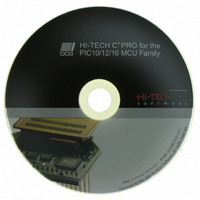SW500010 Microchip Technology, SW500010 Datasheet - Page 36

SW500010
Manufacturer Part Number
SW500010
Description
HI-TECH C PRO FOR PIC10/12/16
Manufacturer
Microchip Technology
Type
Compilerr
Series
PIC10/12/16r
Specifications of SW500010
Supported Families
PIC10, PIC12, PIC16
Core Architecture
PIC
Software Edition
Professional
Kit Contents
Software And Docs
Mcu Supported Families
PIC10/12/16
Tool Type
Compiler
Lead Free Status / RoHS Status
Not applicable / Not applicable
For Use With/related Products
PIC10, PIC12, PIC14, PIC16, PIC16E
Lead Free Status / Rohs Status
Lead free / RoHS Compliant
Other names
019P
778-1006
778-1006
778-1006
778-1006
- Current page: 36 of 502
- Download datasheet (3Mb)
Debugging Information
C PRO for the PIC10/12/16 MCU Family. The File Type column lists the filename extension which
will be used for the output file.
UBROF files. If you use the -O option to specify an output filename with a .bin type, for example
-Otest.bin, PICC will produce a binary file. Likewise, if you need to produce UBROF files, you
can use the -O option to specify an output file with type .ubr, for example -Otest.ubr.
2.4.2 Symbol Files
The PICC -G option tells the compiler to produce several symbol files which can be used by debug-
gers and simulators to perform symbolic and source-level debugging. Using the --IDE option may
also enable symbol file generation as well.
information. This file is produced by the linker after the linking process has been completed. If
no symbol filename is specified, a default filename of file.sym will be used, where file is the
basename of the first source file specified on the command line. For example, to produce a symbol
file called test.sym which includes C source-level information:
This option will also generate other symbol files for each module compiled. These files are produced
by the code generator and do not contain absolute address. These files have the extension .sdb.
The base name will be the same as the base name of the module being compiled. Thus the above
command line would also generate symbols files with the names test.sdb and init.sdb.
2.4.3 MPLAB-specific information
Certain options and compiler features are specifically intended to help MPLAB perform symbolic
debugging. The --IDE=MPLAB switch performs two functions, both specific to MPLAB. Since
MPLAB does not read the local symbol information produced by the compiler, this options generates
additional global symbols which can be used to represent most local symbols in a program. The
format for the symbols is function.symbol. Thus, if a variable called foo was defined inside the
function main(), MPLAB would allow access to a global object called main.foo. This symbol
format is not available in assembler code. References to this object in assembler would be via the
symbol
can better follow the C source when performing source-level stepping.
by the MPLAB IDE.
36
In addition to the options shown, the -O option may be used to request generation of binary or
The -G option produces an absolute symbol files which contain both assembler- and C-level
The --IDE=MPLAB switch also alters the line numbering information produced so that MPLAB
This option also adjusts the format for compiler errors so that they can be more readily interpreted
PICC --CHIP=16F877A -Gtest.sym test.c init.c
PICC Command-line Driver
Related parts for SW500010
Image
Part Number
Description
Manufacturer
Datasheet
Request
R

Part Number:
Description:
Manufacturer:
Microchip Technology Inc.
Datasheet:

Part Number:
Description:
Manufacturer:
Microchip Technology Inc.
Datasheet:

Part Number:
Description:
Manufacturer:
Microchip Technology Inc.
Datasheet:

Part Number:
Description:
Manufacturer:
Microchip Technology Inc.
Datasheet:

Part Number:
Description:
Manufacturer:
Microchip Technology Inc.
Datasheet:

Part Number:
Description:
Manufacturer:
Microchip Technology Inc.
Datasheet:

Part Number:
Description:
Manufacturer:
Microchip Technology Inc.
Datasheet:

Part Number:
Description:
Manufacturer:
Microchip Technology Inc.
Datasheet:










